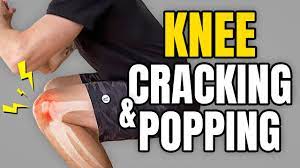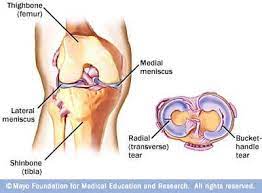
Do your knees make crackling or popping sounds when you move? If so, you may be experiencing knee crepitus. While knee crepitus is often harmless, it can be a cause for concern in some cases. In this blog post, we will delve into what knee crepitus is, its possible causes, and when it’s appropriate to seek the expertise of a physiotherapist.
Knee crepitus refers to the sensation or sound of grinding, popping, or crackling in the knee joint during movement. This condition can be categorized into two types: benign crepitus and pathological crepitus.
Benign crepitus is generally harmless and commonly associated with age-related changes in the knee joint. It may be accompanied by mild discomfort but does not usually cause significant pain or functional limitations.
It can occur when:
- Cartilage surfaces of the knee rub against each other
- Air pockets are released within the joint
- Tendons or ligaments snap over each other
- Synovial fluid flows through the knee
 On the other hand, pathological crepitus can indicate an underlying issue, such as joint inflammation, cartilage damage, meniscus or bony loose bodies, requiring appropriate medical attention.
On the other hand, pathological crepitus can indicate an underlying issue, such as joint inflammation, cartilage damage, meniscus or bony loose bodies, requiring appropriate medical attention.
So when should we go to see a physiotherapist about our noisy knees? While knee crepitus can be a normal occurrence, there are situations where seeking the guidance of a physiotherapist is advisable:
- Persistent pain or swelling: If your knee crepitus is accompanied by persistent pain, swelling, or a feeling of instability, it’s important to consult a physiotherapist. They can assess the underlying causes, provide a proper diagnosis, and recommend appropriate treatment strategies.
- Limited range of motion: If you notice a decrease in your knee’s range of motion or experience difficulty in performing daily activities, a physiotherapist can help identify any muscular imbalances, joint restrictions, or other factors contributing to these limitations.
- Functional limitations: If knee crepitus affects your ability to engage in sports, exercise, or perform your regular activities, a physiotherapist can provide specific exercises, stretches, and rehabilitation techniques to improve knee function and reduce discomfort.
- Previous knee injuries: If you have a history of knee injuries, surgeries, or conditions such as osteoarthritis, a physiotherapist can assess your knee’s overall health, address any underlying issues, and develop a tailored treatment plan to manage symptoms effectively.
- Lifestyle modifications: If knee crepitus affects your overall quality of life or limits your participation in activities you enjoy, a physiotherapist can offer guidance on lifestyle modifications, joint protection techniques, and assistive devices to minimize discomfort and maximize function.
Remember, it’s important to consult a healthcare professional if you have concerns about knee crepitus, especially if it is accompanied by pain, swelling, or functional limitations. They can provide a comprehensive evaluation, recommend appropriate treatment options, and help you regain optimal knee health. Don’t let noisy knees hinder your daily activities—seek professional advice to keep your knees healthy and pain-free.
Noisy Knees? Understanding Knee Crepitus and When to See a Physiotherapist
Do your knees make crackling, grinding, or popping sounds when you move? If so, you may be experiencing knee crepitus. While knee crepitus is often harmless, it can sometimes signal an underlying issue. In this blog, we’ll explore what knee crepitus is, its potential causes, and when it’s time to see a physiotherapist for expert advice and treatment.
What Is Knee Crepitus?
Knee crepitus refers to the sensation or sound of grinding, popping, or crackling in the knee joint during movement. It can be grouped into two categories: benign crepitus and pathological crepitus.
Benign crepitus is generally harmless and often linked to age-related changes in the knee joint. It might come with mild discomfort but usually doesn’t cause significant pain or impact daily function.
Common causes include:
- Cartilage surfaces of the knee rubbing together
- It may be caused by potential muscle imbalance issues around the knee and the kneecap.
- Release of air bubbles within the joint
- Tendons or ligaments snapping over each other
- Movement of synovial fluid through the joint
On the other hand, pathological crepitus may indicate a more serious issue such as joint inflammation, cartilage damage, meniscus tears, or loose bone fragments. This type often requires professional assessment and treatment. These can be addressed effectively and quickly by a Physiotherapist and quite often simple subtle changes in muscle tightness and strength can result in significant improvements in crepitus and soreness.
When Should You See a Physiotherapist for Knee Crepitus?
While crackling knees can be completely normal, there are certain signs that suggest it’s time to seek help from a physiotherapist:
- Persistent knee pain or swelling
If crepitus is accompanied by ongoing discomfort, swelling, or a feeling of instability, it’s best to consult a physiotherapist. They can assess the root cause and provide an accurate diagnosis with a targeted treatment plan. - Reduced range of motion
Difficulty bending or straightening your knee? A physio can evaluate any joint restrictions or muscular imbalances contributing to the problem. - Impact on daily function or exercise
If noisy knees are affecting your ability to walk, run, squat, or play sports, a physiotherapist can help restore knee function with tailored exercises and rehabilitation strategies. - History of knee injuries or osteoarthritis
Previous injuries or existing conditions like knee osteoarthritis increase your risk of ongoing crepitus and joint dysfunction. A physio can offer long-term strategies to protect your knee and manage symptoms. - Quality of life concerns
If your knee crepitus is limiting your activity or affecting your quality of life, physiotherapy can guide you with lifestyle modifications, joint protection techniques, and appropriate aids to keep you moving comfortably.
If you’re unsure whether your noisy knees are normal or need attention, it’s always best to check in with a physiotherapist. At MGS Physiotherapy, we’re experienced in treating knee crepitus, knee pain, and related conditions using a combination of manual therapy, exercise rehab, and tailored advice.
Don’t let crackling knees slow you down. Book a physiotherapy appointment today and take the first step towards healthy, pain-free knees.
CALL NOW TO BOOK YOUR APPOINTMENT
Author –  Elliott Lang (North Curl Curl)
Elliott Lang (North Curl Curl)
With a sporting background as a competitive javelin thrower with a degree in Exercise and Sports Science – Elliott is uniquely skilled in the intricacies of diagnosing, managing and rehabilitating sporting injuries. This especially applies to overhead sports such as throwing, tennis, swimming, and golf.
He loves playing golf – and currently has a handicap of 12 and hoping to get below 10 by the end of the year!
You can see Elliott running along Curl Curl beach in his lunch breaks trying to get my fastest 5km time
Click here to learn more about Elliott.
FAQs – Knee Crepitus
